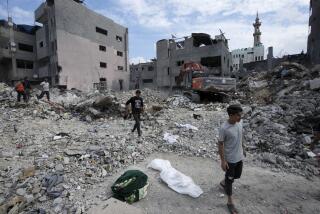Car bombs shatter air of calm in Iraqi city
- Share via
BAGHDAD — The wails of mourners reverberated Thursday across the Shiite Muslim city of Amarah, still reeling from three car bombs that ripped through its main market the previous day.
The local health department lowered the death toll from 41 to 28, citing confusion in the aftermath of the first major bombing attack to hit the southern city during the Iraq war. At the same time, the estimate of the number of injured grew to at least 180, said Dr. Zamil Shiya, who heads the health department.
The wounded filled the city’s two main hospitals. One old man lay wheezing on a bed at Sadr General Hospital, his entire body blackened with shrapnel wounds. In the hallway, Hassenain Ali turned to face the wall, holding his head in his hands and crying with worry for his 16-year-old brother.
“My brother Haider is seriously injured in his head with shrapnel, and until now the doctors can’t stop the bleeding,” he said, moaning.
Wednesday’s apparently synchronized blasts, Iraq’s bloodiest in months, were a sharp reminder that insurgents remain a potent force in Iraq, despite the 60% decline in attacks reported since U.S. forces completed a buildup of 28,500 additional troops in June.
Four people were killed and 12 wounded Thursday in coordinated bombings in the mostly Kurdish city of Khanaqin, about 90 miles northeast of Baghdad near the Iranian border. Police said the initial explosion was minor and caused no casualties. But as onlookers gathered round, a second blast ripped through the crowd.
The police command in Diyala, the province that includes Khanaqin, also reported the discovery of 16 bodies the previous day in a mass grave near Muqdadiya. Twelve of the bodies were beheaded and four had bullet holes to the head, said Maj. Raad Hadithy, adding that the victims appeared to have been killed recently. The U.S. military could not confirm the finding and said it might be a false report.
Diyala, populated by a volatile mix of Sunnis, Shiites and Kurds, remains one of Iraq’s most violent provinces.
In Baghdad, a car bomb exploded Thursday about 200 yards away from the Italian Embassy, killing one Iraqi and injuring six others, including three policemen, officials said. It was not clear whether the embassy had been the intended target.
In the early hours of the morning, three more bombs exploded near liquor stores in central Baghdad, causing damage but no casualties. A fourth device was defused by police.
The U.S. military said soldiers killed nine suspected insurgents in a gun battle Wednesday near Balad. A woman was also killed and four children wounded during the exchange, though the military said it was not clear whether they were shot by militants or American soldiers.
The blasts in Amarah shattered the confidence of the relatively calm city, which remained under a dusk-to-dawn curfew Thursday. Most businesses were shuttered and few people ventured from their homes, unless they had funerals to attend or wounded to visit in the hospital.
The top U.S. commander in Iraq, Gen. David H. Petraeus, and U.S. Ambassador Ryan Crocker condemned the attack in a statement and pledged to work with the Iraqi authorities to bring those responsible to justice. The British military based in nearby Basra dispatched blankets, sheets, wheelchairs and medical supplies to Amarah to help cope with the casualties.
Funeral tents were erected in front of homes to receive mourners. In their shade, men embraced and wept silently, as the sound of keening women echoed from behind closed doors.
Kadim Jawad’s three sons gathered beneath one tent to grieve for the retired civil servant, who left home early Wednesday to buy bread for the family breakfast and never came back.
“Before this, we only saw such things on television,” Ali Jawad said. “God protect us from what may happen next.”
The largest number of dead came from the two neighborhoods closest to the market. When the first car bomb detonated in a parking lot, they were among the first to run to help, only to be cut down in subsequent blasts.
Local officials blamed the Sunni Arab militant group Al Qaeda in Iraq, which has rarely penetrated the overwhelmingly Shiite south. The major threat in the area has been the rivalry among militias linked to Iraq’s main Shiite political formations, which are locked in an often violent competition for power and influence in the oil-rich region.
Iraqi police and soldiers set up checkpoints across Amarah on Thursday, provoking heated exchanges with some residents who accused them of failing to protect them from the previous day’s carnage.
“Now you want to inspect my car, after all those people have already been slaughtered?” one taxi driver complained to the policeman who pulled him over to search his trunk.
“Why do you think I’m standing here?” the policeman retorted. “We are here to protect you.”
--
Special correspondent Asso Ahmed in Khanaqin and special correspondents in Amarah and Baghdad contributed to this report.
More to Read
Sign up for Essential California
The most important California stories and recommendations in your inbox every morning.
You may occasionally receive promotional content from the Los Angeles Times.












